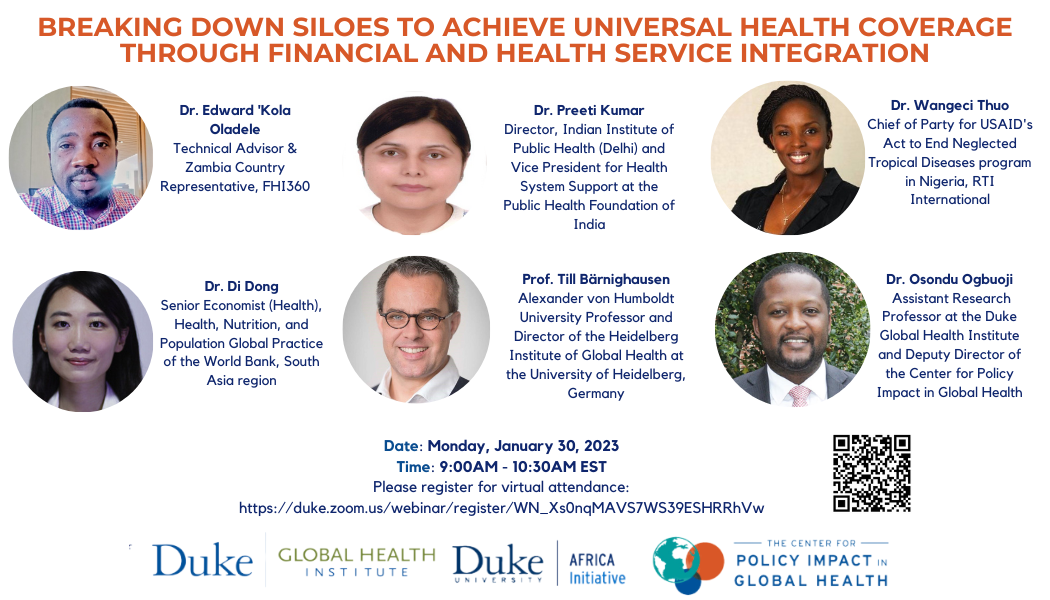Despite observed differences in healthcare delivery systems across Africa and Asia, countries on both continents share similar factors that influence health and healthcare. These include demographic, epidemiologic, economic, social, cultural, and political factors. They also face similar challenges such as (i) difficulties expanding healthcare access to large population groups, many of which live in poverty, (ii) addressing the unfinished agenda of deaths from infections and maternal and child health conditions, (iii) difficulties in service delivery reorganization to match changing population and disease patterns, and (iv) emerging diseases accelerated by climate change, some of which have epidemic and pandemic potential.
This academic dialogue series aims to create a flow and exchange of ideas surrounding their similar global health issues between the two continents. These dialogues bring together speakers, experts, global leaders, scholars, and researchers from Asia, Africa, and all across Duke University to discuss these issues and encourage collaboration to expand on the current research on the following topics.
- Tackling the unfinished agenda of maternal and child health in Africa and Asia: Promising directions to address maternal mortality challenges
- Achieving sustainable financing of universal health coverage
- Transforming from vertical to horizontal health programs
- Addressing the impacts of climate change on health
See respective tabs for details on each seminar.
This project is funded by the Duke Africa Initiative
Project Team:
Ekene Osakwe, Graduate research assistant, Duke Global Health Institute
Kiara Ekeigwe, Undergraduate research assistant, Duke University

The agenda of eliminating preventable deaths in mothers and children in both Africa and Asia remains unfinished as sub-Saharan Africa and Southern Asia contributed to 86% of the global maternal deaths in 2017. Though there have been great strides in each continent’s attempts at reduction, 60% in MMR and in Southern Asia and 40% in sub-Saharan Africa since 2000, continuous work is necessary for continuing this reduction especially due to the diversion of attention due to other health challenges in both continents.
This seminar, moderated by Dr. Megan Huchko, was co-hosted with the Center for Global Reproductive Health and focused on highlighting key initiatives undertaken by countries, in collaboration with non-government entities and the private sector to address maternal mortality issues across both continents. The webinar was held on Friday, April 22, 2022. The following speakers participated in this seminar.
- Dr. Qian Long, Assistant Professor, Duke Kunshan University
- Mariam Claeson, Former director of MNCH at BMGF, former head of Global Financing Facility, currently based at the Karolinska Institute
- Jacquelyn Caglia, MERCK for Mothers
- Nick Pearson, Founder and CEO of Jacaranda Health

The impact of climate change on health is evident in its effect on disease patterns, especially seen in Africa and Asia. Resurgence in mosquito-borne diseases and zoonotic diseases with pandemic potential suggest to experts that the rapid environmental, demographic, technological and social change are increasing the frequency of zoonotic diseases.
Linda S Birnbaum, PhD, DABT, ATS, will present “The Intersection of Global Environmental Health and Climate Change” on Friday, October 21 12:00-1:15 pm Eastern. While climate change may be the existential challenge the world faces, we also must deal with overwhelming additional environmental challenges to global health. Health disparities, water and soil pollution, microbial threats all challenge our knowledge as well as our future. What are some of the key research needs facing us at this time? And how can we address them?
Dr. Birnbaum is the former Director of the National Institute of Environmental Health Sciences (NIEHS) of the National Institutes of Health, and the National Toxicology Program (NTP). After retirement, she was granted scientist emeritus status and still maintains a laboratory. As a board-certified toxicologist, Birnbaum served as a federal scientist for 40 years. Prior to her appointment as NIEHS and NTP Director in 2009, she spent 19 years at the U.S. Environmental Protection Agency (EPA), where she directed the largest division focusing on environmental health research. A Scholar in Residence with the Duke University Nicholas School of the Environment, Dr. Birnbaum is also an adjunct professor at the University of Queensland in Australia, the School of Public Health of Yale University, the Gillings School of Global Public Health, the Curriculum in Toxicology, and the Department of Environmental Sciences and Engineering at the University of North Carolina at Chapel Hill.
This seminar will be presented in Field Auditorium (room 1112), Grainger Hall on the Duke University campus. Dr. Birnbaum’s seminar is a catalyst event to bring researchers together to start a conversation on climate change and health in Africa and Asia.
We kindly ask ALL individuals who are interested in attending (whether in person or virtually) to please fill out this registration form by 1 pm Eastern on Monday, October 17.
Attending virtually? In addition to the form linked above, you must register HERE to receive the Zoom link.


The Millennium Development Goals and the Sustainable Development Goals for health led to an increased focus on key health interventions for HIV, TB, malaria, and maternal and child health. In many low- and middle-income countries (LMICs), a vertical program approach funded by donors was adopted to control these diseases in siloes. However, the vertical approach within countries has led to inefficiencies and a lack of coordination within the health system. WHO has identified a lack of health service integration as one of the main limitations to program efficiency and effectiveness in LMICs. In response to changing disease patterns and success in tackling infectious diseases, many countries have started shifting away from vertical, single-disease programs, towards a horizontal, system-wide, integrated approach. This shift is necessary if countries intend to protect health gains while facing new challenges. Countries that have successfully shifted towards integration include China, Morocco, South Africa, and Thailand. Despite observed differences in healthcare delivery systems across Africa and Asia, countries on both continents share similar factors that influence health and healthcare. As countries face these challenges, their unique experiences create opportunities for shared learning and collaboration across both continents.
The Center for Policy Impact in Global Health at the Duke Global Health Institute is organizing this seminar to examine health systems approaches in Africa and Asia that encourage flexibility and allow for transformation from vertical to horizontally integrated healthcare delivery.
Featured speakers:
- Dr. Di Dong, Senior Economist (Health), Health, Nutrition, and Population Global Practice of the World Bank, South Asia region
- Dr. Preeti Kumar, Director, Indian Institute of Public Health, Delhi and Vice President for Health System Support at the Public Health Foundation of India
- Dr. Wangeci Thuo, Chief of Party for USAID’s Act to End Neglected Tropical Diseases program in Nigeria, RTI International
- Dr. Edward ‘Kola Oladele, Technical Advisor & Zambia Country Representative, FHI360
- Prof. Till Bärnighausen, Director of the Heidelberg Institute of Global Health at the University of Heidelberg, Germany
- Dr. Osondu Ogbouji, Assistant Research Professor at the Duke Global Health Institute and Deputy Director of the Center for Policy Impact in Global Health.

Date and time of the seminar: January 30, Monday from 9:00 AM – 10:30 AM EST
Zoom registration link: https://duke.zoom.us/webinar/register/WN_Xs0nqMAVS7WS39ESHRRhVw

Universal health coverage (UHC) aims to provide equitable, quality health services and financial risk protection to all. Varying levels of progress exist across both continents due to similar challenges such as insufficient domestic resource mobilization, fragmented delivery of care, high burdens of both infectious and non-communicable diseases, pockets of poverty and vulnerability, and weak public health care systems. The center is planning a series of seminars under the UHC topic.
The first seminar will focus on the role of strategic purchasing and health technology assessments for UHC.
TOPIC 1: More healthcare from current budgets: experiences with strategic purchasing in Africa and Asia

Low- and middle-income countries (LMICs) face unique challenges in their bid for universal health coverage (UHC). These changing healthcare needs are a result of epidemiological and demographic changes, as well changes in the health financing architecture. As such, policymakers in LMICs need effective systems of selecting the most needed services and systems to determine the most appropriate ways to pay for them. This goal can be achieved through strategic purchasing and the adoption of health technology assessments (HTAs). Despite the benefits of strategic purchasing and health technology assessments (HTAs), their adoption in Africa and Asia has been hampered by a lack of political will, ineffective data systems and evidence, limited capacity, and infrastructure. The low levels of investment in building these systems in both regions make it difficult to generate the evidence needed to support the adoption of new health technologies. However, some countries on both continents have successfully adopted HTAs and strategic purchasing.
In this seminar, policymakers, researchers, and experts from Africa and Asia will discuss their experiences with HTAs and strategic purchasing on both continents. They will discuss the pros and cons of adopting these mechanisms, address challenges faced and lessons learned, and identify areas that will benefit from new research and evidence.
The featured speakers include:
- Prof. Chen Yingao, Associate Dean of the School of Public Health and Director of the Key Lab of Health Technology Assessment (National Health Commission) at Fudan University, Shanghai
- Prof. Justice Nonvignon, Professor at the School of Public Health, University of Ghana and Acting Director of the Health Economics Unit, Africa CDC
- Ipchita Bharali, Policy Associate, Center for Policy Impact in Global Health, Duke Global Health Institute
- Prof. Gavin Yamey, Hymowitz Professor of the Practice of Global Health and Public Policy, Duke Global Health Institute and Director of the Center for Policy Impact in Global Health
Click here to view the live recording of the seminar.
Details of other seminars under this topic will be coming soon.

